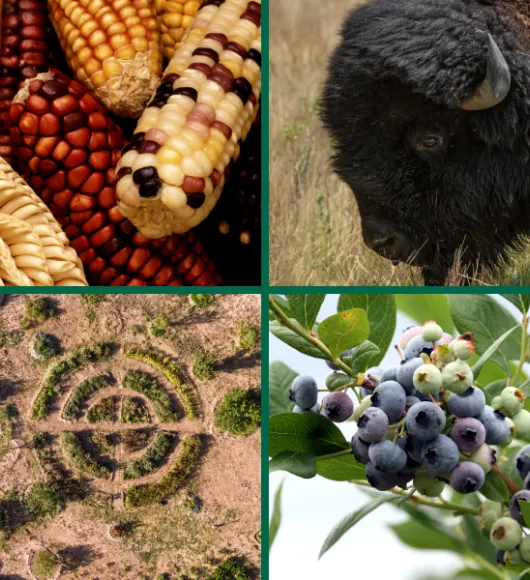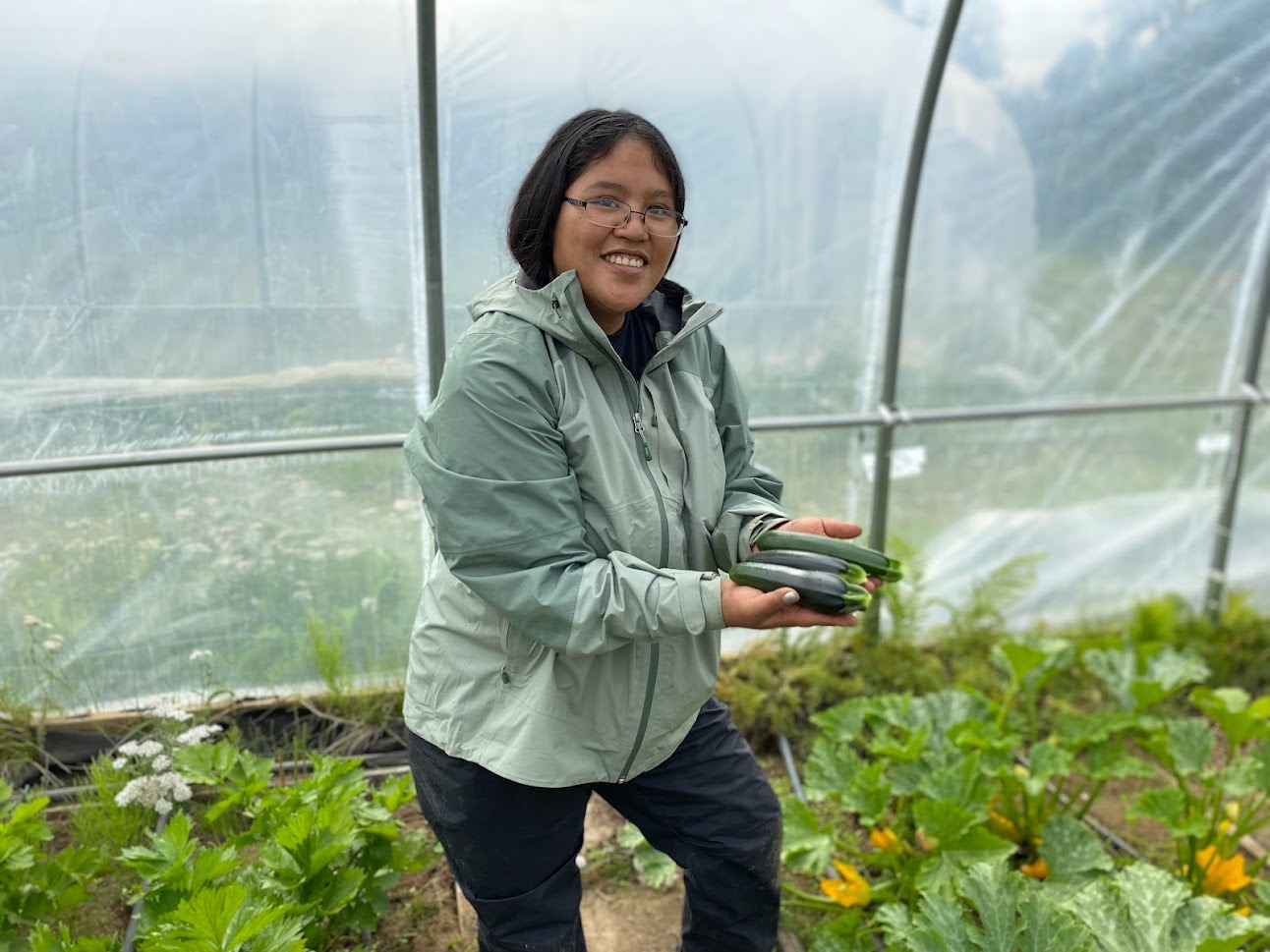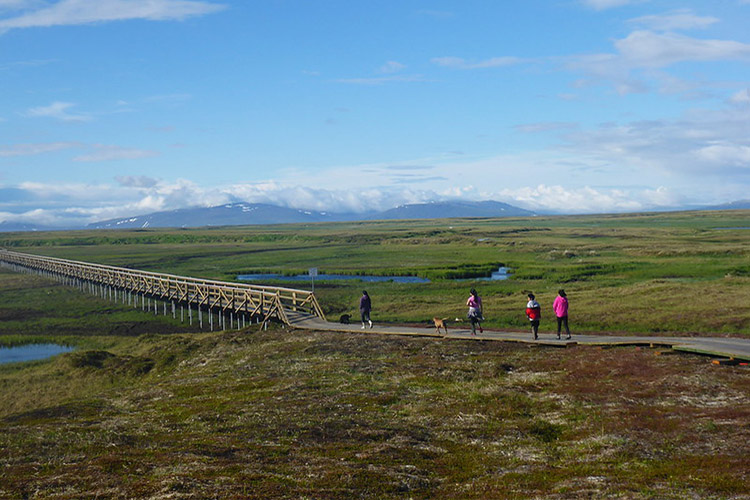Our goal is to make USDA farm and conservation programs and services more meaningful and accessible to Tribal nations and citizens on more than 64 million acres of tribal and allotted trust land used for farming, grazing by livestock and wild game, and forestry.
By connecting tribal nation leaders, land managers, agricultural producers, and citizens with USDA programs and services, USDA seeks to better fulfill its commitment and government-to-government responsibilities to tribal nations and promote opportunities for land access, indigenous representation, conservation partnerships, and support for tribal food sovereignty.
Embracing the Unique Trust Relationship with Tribal Nations
Government-to-Government Relationship: The United States has a unique government-to-government relationship with federally recognized Tribes as defined through treaties, statutes, court decisions, Executive Orders, and Departmental Regulations.
Tribal Consultation, Coordination, and Collaboration: USDA Departmental Regulation 1350-002 directs the Farm Service Agency (FSA), Natural Resources Conservation Service (NRCS), Risk Management Agency (RMA), and Farm Production and Conservation Business Center leadership and employees to engage in government to government consultation and collaboration with federally recognized Tribes on policy development and program activities. The goal of which is to ensure that tribal perspectives on the social, cultural, economic, and ecological aspects of agriculture, as well as tribal food and natural resource priorities and goals, are heard and fully considered in agency decision-making processes.
Outcomes: Consultation, coordination, and collaboration make USDA programs better fit Tribal settings and increase program participation by Tribal Nations, tribal agricultural producers, tribal forest stewards, and landowners.
- Revised USDA program policies, procedures and standards based on tribal knowledge, perspectives and priorities.
- Coordinated Tribal/USDA outreach efforts to producers and landowners.
- Collaboration between leadership and subject matter experts from Tribal Nations, USDA agencies, and tribal organizations on projects of mutual benefit.
- Increased coordination between government agencies to provide better service to Tribal Nations and their citizens.
Service on Indian Reservations: Tribal Nations are welcome to request hosting FSA and NRCS Service Center offices on their land. For more information, see USDA Departmental Regulation 1340-002.
Indigenous Knowledge and USDA Programs: Indigenous Knowledge plays a vital role in the scientific, technical, social, and economic advancements by helping us to better understand the natural world. USDA is committed to implementing the government-wide directive recognizing and including Indigenous Knowledge in federal research, policy, and decision-making.
Learn More About USDA Agencies with Farm Programs
USDA Office of Tribal Relations
The USDA Office of Tribal Relations (OTR) leads the intergovernmental role for the USDA with Tribes while individual agencies (FSA, NRCS, RMA) consult with Tribes on project and program level efforts to enhance access to USDA’s various programs and services to Tribes, tribal organizations and citizens.
Bureau of Indian Affairs
A Memorandum of Understanding (MOU) between the Bureau of Indian Affairs (BIA), FSA, and NRCS was extended in 2024 through 2029 to collaboratively plan and implement USDA programs affecting tribal lands.
Land Access
In addition to the farm operating and ownership loans for individuals, USDA offers two tribal-specific loan programs.
- The Indian Tribal Land Acquisition Loan Program, administered by FSA, helps Tribal Nations purchase additional property within the reservation to increase agricultural productivity on their lands.
- The Highly Fractionated Indian Land Loan Program helps Tribes, Tribal entities and Tribal members alleviate the problems caused by fractionated interests on tribal lands through purchase agreements. Through land consolidation, current and new agriculture operators can improve and expand access to USDA programs and save tribal farmland for future generations. This intermediary lender loan program is financed through revolving loan funds from FSA.
Additional land access opportunities are available through:
- The Heirs’ Property Relending Program helps to address heirs’ property issues that have long been a barrier for many producers and landowners trying to access USDA programs and services. The relending program provides access to capital to help heirs find a resolution. USDA announced that Akiptan, Inc., Cherokee Nation Economic Development Trust Authority, and Shared Capital Cooperative, which has a partnership with Federation of Southern Cooperatives, are approved intermediary lenders through the Heirs’ Property Relending Program.
- The Increasing Land, Capital, and Market Access Program helps underserved producers by increasing land, capital and market access.
Partnerships in Tribal Conservation
USDA is grateful for the sustained commitment on the part of tribal elected leadership to consult with USDA leadership. Their knowledge, perspectives, and priorities drive crucial changes to USDA policy and programs. The dedication of tribal natural resource and agricultural staff to share their subject matter expertise broadens USDA’s understanding of natural resource concerns and techniques and practices to heal the land.
Tribal Nation alliances and organizations are helpful in building partnerships and situational awareness. They generously allow USDA to be part of the conferences and outreach efforts. And they dedicate staff to accomplish joint efforts through cooperative agreements with USDA. Tribal producers broaden USDA’s understanding of land stewardship and how programs can be improved to be more meaningful and practical. Thanks to these efforts, Tribal Nations and producers more fully participate in USDA programs.
USDA encourages Tribal Nations, producers and organizations to build on this legacy allowing us the honor of contributing technical and financial assistance to their efforts to heal the earth through better land stewardship.
Support for Tribal Food Sovereignty
Tribal Nations and tribal organizations help USDA agencies design and implement programs to complement Tribal Food Sovereignty efforts.
USDA’s Indigenous Food Sovereignty Initiative:
- Encourages incorporation of traditional food ways in USDA programs,
- Supports improved Indian Country access to food and agriculture markets, and
- Promotes Indigenous health by ensuring foods included in national food programs are tailored to American Indian/Alaska Native dietary needs.
USDA agencies support tribal food sovereignty and regenerative agriculture efforts through the improved delivery of programs and services.
USDA recognizes traditional animals in disaster assistance programs, includes revenue generating indigenous foods in crop insurance, provides grant opportunities offering support on urban agriculture targeting indigenous foods, and provides technical assistance on increasing indigenous foods in various programs.
USDA released a Producer Handbook: Transitioning From Cattle to Bison, which was created in partnership with Intertribal Buffalo Council (ITBC). The handbook can inform interested tribal communities and Native cattle producers about the process, costs, and factors involved in transitioning to bison production.

Underlined Header
FSA County Committees
One great way to make a difference is through FSA County Committees. Committee members ensure fair and equitable delivery of FSA farm programs in their county or multi-county jurisdiction. FSA is committed to establish and strengthen partnerships with tribal governments to engage tribal communities and increase participation in the county committee election nominations and voting processes.
Learn more about tribal agricultural landowner voting eligibility. Nominations open in mid-June and end in early August each year. Ballots are mailed out in November and due back to FSA in early December. If you are interested in voting and serving on the County Committee, contact your local FSA office for information.
Underlined Header
NRCS Collaboration
NRCS is committed to meaningful tribal consultation with tribal nation leadership. NRCS also collaborates and coordinates with Tribal Conservation Advisory Councils on a state and regional level and works with Tribal Conservation Districts across the country. Tribal representatives who serve on these councils and districts help NRCS improve its programs, practices, and policies on an ongoing basis. These advisory councils have really helped NRCS and other USDA agencies work toward meeting our tribal trust responsibilities. Contact your local NRCS office for more information.
Tribal Organizations
Tribal organizations assist USDA agencies to get on a better path to meet agency federal tribal trust responsibilities. Key national non-profit organizations include:
- American Indian Higher Education Consortium
- Association of American Indian Farmers
- First Nations Development Institute
- Indian Land Tenure Foundation
- Indian Nations Conservation Alliance
- Indigenous Food and Agriculture Initiative
- Intertribal Agriculture Council
- InterTribal Buffalo Council
- Intertribal Timber Council
- National Congress of American Indians
- Native American Agriculture Fund
Events and Resources
Upcoming Events
Supporting the Next Generation
- USDA Tribal Youth Guide helps native youth learn about available USDA programs and resources.
- Resources for Tribal Youth Organizations
- USDA tribal college partnership with the American Indian Higher Education Consortium (AIHEC)
Additional Resources
- USDA Rural Development Programs
- 2022 USDA Resource Guide for American Indians/Alaska Natives
- FSA program eligibility forms for individuals, entities, and Tribal Nations
- Tribal Partnerships Guide for Tribal Nations
- NRCS Tribal Relations Strategy
- Disaster Assistance at a Glance
- Resources for beginning farmers and ranchers
- Upcoming national program deadlines
- Information about doing business with FSA, NRCS and RMA
- Translated materials
- Interpretation services
Outreach Support
Learn more about outreach:
Feedback and Questions
To provide feedback or ask questions about this web page, please contact the Farm Production and Conservation National Tribal Liaison team at tribal.fpac@usda.gov.
- FSA Tribal Liaison: Jennifer Perez
- FSA Federal Preservation Officer: John Rissetto
- NRCS Tribal Liaison: Pedro Torres
- RMA Tribal Liaison: Sean Patrick
Find Your Local Service Center
USDA Service Centers are locations where you can connect with Farm Service Agency, Natural Resources Conservation Service, or Rural Development employees for your business needs. Enter your state and county below to find your local service center and agency offices. If this locator does not work in your browser, please visit offices.usda.gov.
Learn more about our Urban Service Centers.
Visit the Risk Management Agency website to find a regional or compliance office or to find an insurance agent near you.















